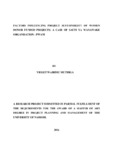| dc.description.abstract | Sauti Ya Wanawake Organization - Pwani (SYWP) is a local women’s movement based at the
Kenyan coastal region, which started in 2001 with an aim for creating a safe space for women to
discuss issues that are affecting them but more so as a forum that contributes to fighting for the
rights of women and children. Having implemented the two projects between 2012and 2013,
with main aim of ensuring peaceful general election and safety for women and to empower
women politically 2013. This study seeks to determine sustainability concerns surrounding these
projects in order to build a strong sustainability framework for current and future projects within
the organisation.The study was guided by four research objectives; To determine the influence of
women participation, management practices, donor trends and government partnership on
sustainability of women funded projects. Review of relevant literature revealed that the stated
factors are the main determinants to donor funded projects’ sustainability. However, little studies
have been done to this effect especially with focus on women in Kenya coast. The descriptive
survey design was used in this study because it is appropriate where the study seeks to describe
characteristics of certain groups, estimate proportion of people who have certain characteristics
and make necessary predictions. In this study the target population was about 1000 women who
have benefited from SAFE and PIK projects. This study used the stratified sampling technique
counties formed the strata, and then respondents were sampled randomly from each strata. The
sample size used was 10% of the target population. Questionnaires and document analysis were
used as the main tools for collecting data. Analysis and presentation of data was done on
MINITAB and Ms excel. Out of the 306 questionnaires distributed in the two projects covered
by the study, a total of 204 were returned but only 200 were used in the analysis. All the factors
assessed revealed some influence on project sustainability. Management practices had the
highest influence according to the agreement scale used, followed by donor trends then women
participation. Government strategies had the least influence according to the study with mean
difference between respondents agreeing and disagreeing being very minimal. Therefore, the
study concluded that for projects to be sustainable, women participation must be enhanced.
Management and donor policies must be inclined to adequately address women issues. | en_US |



